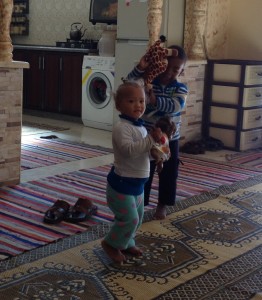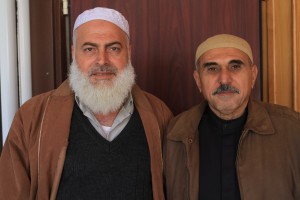WPSR back in Gaza, day two by Gerri Haynes, photos by Bob Haynes
Our team has eight members: Rich Grady and Ismael Zamilpa (pediatric urologists), Laura Hart (adult urologist), Don Mellman (neurosurgeon), Chuck Cowan (pediatric autism specialist), Grant O’Keefe (general and trauma surgeon), Bob Haynes (cardiologist) and me. We parted in the morning with the surgeons and cardiologist in meetings and screening and consulting on patients and Chuck Cowan teaching.
I met with friends of several years – women who are experiencing the trauma of living in Gaza under siege. Again this year, I asked the women what they would like the people of the United States to know. Here are some of their responses:• We want the people of the world to know what is happening here – we think people would do something if they knew how bad things are. We are living in a prison.
• We need the siege to be ended.
• People in Gaza are angry and frustrated. We are without electricity much of the time. Even though we have a new technology – a rechargeable battery – it provides very little light and is expensive to charge.
• There is very little fuel and it is very expensive. With the tunnels closed, all of our fuel comes from
Israel and it is four times more expensive now than when we were able to get fuel through the tunnels from Egypt.
• My brother needs a liver transplant. This is not available in Gaza – he got permission to go to Egypt, but when he got to the crossing at Rafah, only two buses were allowed through and he was turned away – the crossing was closed again as it often is.
• There is no material for building – we would like to move, but there is no material for building. Fifty-eight people live in our house – which has seven tiny apartments.
• Most adults in the family have jobs, but the pay is very low
• The UN has cut the monetary support given to 70 – 80% of Gaza it serves and has stopped the distribution of food staples such as rice, sugar, and oil to many families.
• Cancer is increasing – we need specialty services – people have to be referred to Egypt or Israel, but this may not be granted.
• Hospital staff needs continuing education – if they leave for more education they may not be allowed to return.
• UN says school children need computers but the UN does not have the money to supply them and we cannot definitely afford to buy computers for our children.
Again, I was impressed by the courage and dedication of these women. The husband of one of the women had died recently and she and their four children had been taken into this crowded home. Somehow, they continue.
Bob Haynes consulted on the care of many cardiology patients at Al Awda Hospital today. One of the patients, whose four older brothers have had cardiac bypass surgery, now also needs to have this surgery. He has family in Jordan and would like to have this procedure done there, but the Rafah crossing has been closed each time he has attempted to leave Gaza for a flight from Egypt. So, he waits. He will try again. Patience and resilience. And the danger of running out of time.RSS feed for comments on this post. TrackBack URI

